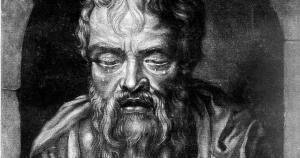227 The wise is one thing, to be acquainted with true judgement, how all things are steered through all.*
 So said Heraclitus: the wisest man to live in Ephesus until Saint John moved there. Saint Basil recommends we begin our studies learning from the noble pagans, particularly in terms of virtue. Says the Saint: “Since the life to come is to be attained through virtue, chief attention must be paid to those passages in which virtue is praised. . . .”
So said Heraclitus: the wisest man to live in Ephesus until Saint John moved there. Saint Basil recommends we begin our studies learning from the noble pagans, particularly in terms of virtue. Says the Saint: “Since the life to come is to be attained through virtue, chief attention must be paid to those passages in which virtue is praised. . . .”
Note how oddly this passage is worded. Heraclitus does not say wisdom is one thing or the wise person does one one thing. Instead this short aphorism says (literally) “one thing is the wise.” In another fragment, Heraclitus refers directly to his one god, Zeus, but not here. This one thing is a principal that if followed unites all the wise making them: being acquainted with true judgment. Judgement is choosing: any fool can choose, but the wise choose truly.
The world is always changing and our data is incomplete so true judgment is hard. God alone will possess true judgment fully so God is fully wise. God is by nature true judgment, because God knows all and is good. He never chooses a falsehood or misunderstands. God has by nature the one thing.
The rest of us as we (constantly) change can hope to participate in the one thing and so become one with the wise! In fact, for Heraclitus this may even be stated more strongly: to have true judgement is to participate in the nature of God. This (may be) an early form of theosis, finding our natures, briefly taken to the one thing that we can share with God.
The true judgment for Heraclitus will show how all things are steered through the all (the whole of the physical cosmos). Things in the cosmos are constantly moving, changing, but there is (for Heraclitus) an eternal Logos that steers the change and is himself unchanging: the word comes from the Word. Partly this is the structure (logos) of the cosmos (sustained by Logos) and might form a reason to think science is possible despite the constant changes in the world. There is an under-arching order that never changes, as Kirk* points out in his commentary on the passage, Heraclitus is not just interested, however, in science. His physical cosmos contains logos and this logos is linked to the great Logos (God). The microcosm and the macrocosm (the smallest view of reality and the broadest view) are linked by similar design.
The Word is found in the word. The things in the word are guided by the word and we can know this work if we judge with truth. Yet the human mind can also find God and the Word that governs the word if only for a moment and can be “the wise.”
Saint John transforms this language at the beginning of his Gospel to express a deeper Truth revealed to the Jewish people. The Logos of Heraclitus is not the Logos of John 1, because the Logos of John has revealed Himself to us in the person of Jesus Christ. We need not seek momentary true judgement, but can see God full of grace and truth. The grace sustains us in the Word.
The logos/Logos of Heraclitus was fire/God/beginning, but lacked the personal nature that God revealed to the Jewish people. Heraclitus (may have) provided a language for the Hebrew message to be put into Greek, but the revelation of God in the person of Jesus Christ is rooted in the deeper, Hebrew, understanding. What Heraclitus saw dimly, the Jewish people experienced. He looked within and also out at the world, but the good God revealed Himself by coming down in the flesh. He came and helped us judge rightly about ideas such as the one and the many, nature and mind.
Glorious truth!
———————————————
*Heraclitus in Presocratic Philosophers (Kirk, Raven, Schofield)













